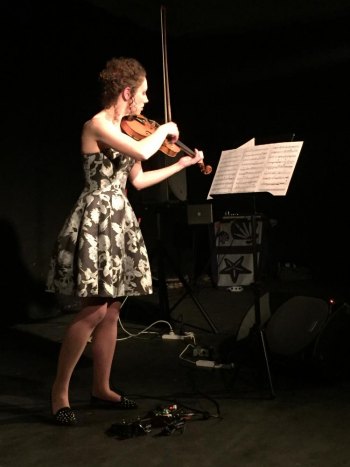
Review: Through the Looping Glass
Through the Looping Glass
Helen Bower
Feat Theatre, Preston
Wednesday October 1st 2014
This review was originally published by Melbourne Arts Fashion.
Featuring compositions by:
Max Perryment (UK)
Grace Hugh Robbins (NSW)
Charles MacInnes (VIC)
Ade Vincent (VIC)
The beauty of Fringe festivals, Melbourne’s in particular, is in the opportunity for artists to take risks and present new or unusual works and concepts to receptive audiences with heightened expectations for something that breaks new ground. While many present successive runs or performances of existing projects, some seize the opportunity to create something new, untested and unusual that has the potential to shatter expectations of normality.
Presented at Preston’s Feat Theatre, Helen Bower’s Through The Looping Glass (TTLG) does this wholeheartedly and exquisitely. Presenting a collection of four contemporary classical pieces for solo violin and loop pedal that were emerged from collaborations between Australian and UK composers, Bower’s virtuosic and exhilarating performance encapsulates exactly what the Melbourne Fringe is about.
The use of loop pedals (effect units that record and repeat passages of audio) is not necessarily a new phenomenon. The use of looping in contemporary composition stems back to John Cage and continued with the minimalists including Steve Reich and Terry Riley through tape-based compositions. The commercial availability of looping pedals especially in recent years has seen legions of guitarists and musicians incorporate looping in composition and live performance. However, despite the availability and origins in contemporary classical music, it is uncommon to see the use of technology particularly at this level in mostly traditional-based performance, particularly in the composition itself.
Bower herself is a stunning player, with an elegant and sensitive yet powerful touch on her instrument. Her high achievements in classical violin alone are means for an audience, however it is her incorporation of the loop pedal into her playing that really makes this performance exciting. Bower creates eerie textures, vast transporting soundscapes, and wonderful moment of emotive harmony and sonic dissonance, creating an entire orchestra at her feet. Her control of the technology in her performance, while clearly the result of a lot of workshopping and rehearsal, is effortless. Although in her own Q&A she referred to the loop station as a second instrument, she fully delivered the impression that is was a mere extension of the one in her hands.
TTLG is a beautifully crafted performance from beginning to end. Each piece presents a different facet of compositional possibility, exploring various extended rhythmic and harmonic techniques, rhythmic synchronisation and modulation, soundscapes and textures. The challenge of composing and performing looped material is in the careful construction of the loops that will repeat constantly, and how to evolve the piece in interesting and unique ways. It is a joy to hear four unique compositions carefully crafted for use within this setting.
London’s Max Perryment’s 4 Miniature Loop Compositions for Violin draws immediate parallels to Steve Reich, as each movement evolves and manipulates listeners’ ears into the next. Sydney-born Grace Huie Robbins’ Landscapes I and II paints beautiful scenery of an ocean and forest respectively, pushing the limitations of her instruments creatively and with clarity. The standout piece for me was Melbourne composer Charles MacInnes’ Wall Fragments, inspired by a visit to Berlin in 1989 shortly after the falling of the Berlin Wall and reflecting on the sounds of the wall being removed by the hands of those present. Hauntingly beautiful and descriptive, this piece particularly stands out with clear intentions for the use of the looper, and is a triumph. The final piece, Melbourne’s Ade Vincent’s The Clockwork Owls creates an energetic and driving piece that is the most accessible of the quartet, and makes excellent use of a repeating motif.
There is a fragility and honesty with looping performances, in that the slightest error can drastically influence the outcome of the piece. With that comes a sincere level of commitment to continue with the piece regardless of any perceived errors. Bower embraces these considerations and steers their outcome gracefully. There is a solid level of commandment on stage, allowing audiences to sit back and experience whatever outcome or deviations the piece may present.
As the role of technology is further embraced in popular culture, it is a joy to observe its crossover into classical fields and used as a sincere and effective tool in composition. Composers must be encouraged to push boundaries to create new works that embrace the potential of technology, and it is wonderful to see the creative possibilities of loop pedals stripped from the hands of guitarists and cover musicians**. Bower has achieved tremendously in the preparation of this project, and its development post Fringe will be one to eagerly observe.
Through The Looping Glass is a breathtaking performance and collection of pieces. While this particular style of composition and performance remains on the outskirts of musical canon, it is imperative that it is embraced wholeheartedly in its early stages so that it may continue. It truly is the epitome of a fine Fringe performance, and one that will surely continue to flourish and mature.
**In one of his current iterations, this author is a looping guitarist/cover musician. He wholeheartedly stands by this comment.
